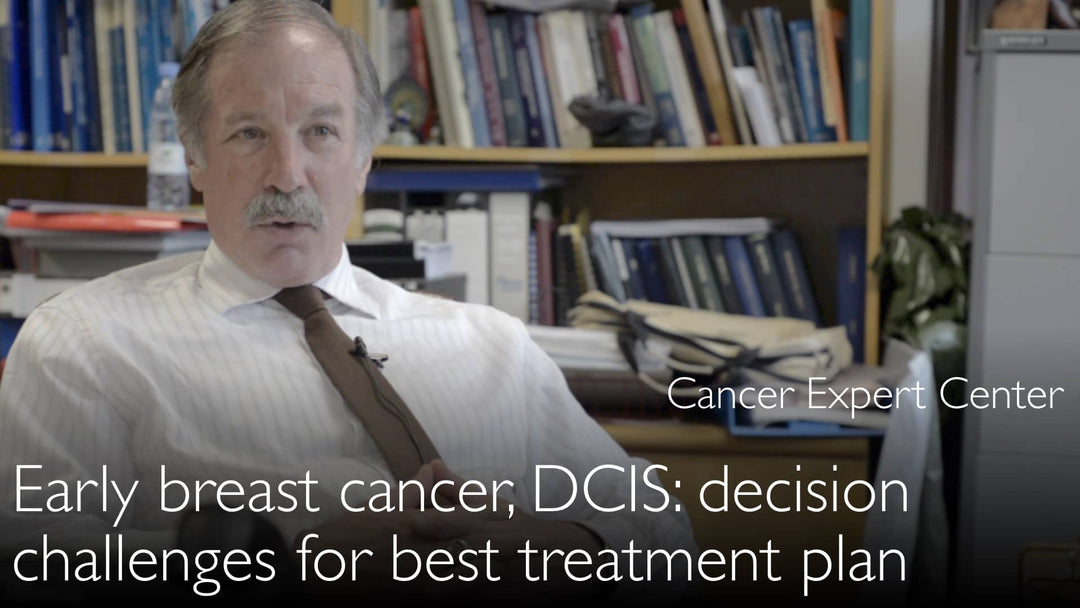Leading expert in breast cancer prevention and treatment, Dr. Jack Cuzick, MD, PhD, explains the complex decisions surrounding DCIS therapy, highlighting the critical need to balance effective treatment against the significant risk of overtreatment, and discusses the potential of molecular markers and precision medicine to guide more personalized care in the future.
Optimizing DCIS Treatment Decisions: Balancing Efficacy and Overtreatment
Jump To Section
- Current DCIS Treatment Landscape
- The Problem of Overtreatment
- Role of Molecular Markers
- Radiotherapy Reassessment
- Precision Medicine Future
- Patient-Oncologist Discussions
Current DCIS Treatment Landscape
When a woman receives a new diagnosis of ductal carcinoma in situ (DCIS), she faces a complex series of therapy decisions. Dr. Jack Cuzick, MD, PhD, a leading authority in the field, emphasizes that treatment must be optimized for the individual patient based on the latest clinical trial results. The initial approach often involves surgery, but the necessity of additional therapies like radiation and endocrine treatment requires careful consideration of the tumor's specific characteristics.
Dr. Anton Titov, MD, in his discussion with Dr. Cuzick, highlights the importance of personalized decision-making. The goal is to provide effective treatment for those who need it while avoiding unnecessary interventions for those with less aggressive disease.
The Problem of Overtreatment
A significant challenge in DCIS management is the widespread issue of overtreatment. Dr. Jack Cuzick, MD, PhD, states unequivocally, "There is no doubt that we are treating more DCIS than we need to." This occurs because physicians cannot yet reliably distinguish between DCIS that will progress to invasive breast cancer and DCIS that will remain indolent.
This diagnostic uncertainty leads to a fear of under-treatment, prompting aggressive interventions. Consequently, a large proportion of women are exposed to the potential side effects of radiation therapy and sometimes undergo unnecessarily extensive surgery. The central challenge, as outlined by Dr. Cuzick, is to safely reduce treatment intensity without compromising patient safety.
Role of Molecular Markers in Therapy Decisions
Molecular testing offers a promising path toward more personalized DCIS treatment. Currently, Dr. Jack Cuzick, MD, PhD, notes that only estrogen receptor (ER) and progesterone receptor (PR) status are well-established enough for routine clinical use. These biomarkers are crucial for deciding whether a patient is a candidate for endocrine therapy, such as tamoxifen or an aromatase inhibitor.
The HER2 tumor marker is also of interest for future therapy decisions, but Dr. Cuzick does not yet recommend its routine testing. A whole range of other markers are under investigation, providing vital insights into breast cancer pathogenesis and helping to identify which DCIS lesions are on a pathway to invasion.
Reassessing the Need for Radiotherapy
Radiotherapy represents the area with the biggest immediate opportunity to reduce overtreatment. Dr. Jack Cuzick, MD, PhD, points out that radiation is currently given to almost every DCIS patient following surgery. However, he poses a critical question: whether radiation therapy is truly necessary for small, low-grade tumors.
This is a very open and active area of research. For many patients with favorable DCIS, the risks and side effects of radiotherapy may outweigh the potential benefits. A more selective approach, guided by better risk stratification, could spare numerous women from this intensive treatment.
The Future of Precision Medicine in DCIS
DCIS is a condition where precision, or P4 medicine, holds tremendous potential for success. The conversation between Dr. Anton Titov, MD, and Dr. Cuzick confirms that a one-size-fits-all approach is outdated. The future of DCIS care lies in using advanced diagnostic tools to predict the biological behavior of an individual's disease.
Dr. Jack Cuzick, MD, PhD, agrees that precision medicine can help a lot of patients. The development of validated genomic tests and other biomarkers will be key to distinguishing aggressive from non-aggressive DCIS, ultimately enabling a dramatic shift toward more conservative and tailored management strategies.
Essential Discussions for Patients and Oncologists
For a woman diagnosed with DCIS, an informed discussion with her oncologist is paramount. Dr. Anton Titov, MD, underscores the need to review all potential molecular tests and their implications for therapy. Patients should feel empowered to ask about their specific tumor characteristics, including ER/PR status, and how this information guides the treatment plan.
Key topics include the necessity of proposed treatments, the evidence behind them, and the potential for overtreatment. Patients must understand the balance between preventing invasive cancer and avoiding the side effects of unnecessary therapy. Dr. Jack Cuzick, MD's insights provide a framework for these crucial conversations, advocating for a more nuanced and evidence-based approach to DCIS care.
Full Transcript
Dr. Anton Titov, MD: Sometimes a woman has a new breast cancer diagnosis. It could be DCIS [Ductal Carcinoma In Situ]. How to find optimal breast cancer therapy in DCIS? How to make therapy decisions that are optimal for an individual breast cancer patient? How to treat breast cancer according to the latest clinical trial results? What should a patient with breast cancer discuss with her oncologist?
What potential molecular tests on the tumor could be done to optimize therapy decisions in DCIS?
Dr. Jack Cuzick, MD: It's fair to say that none of the molecular markers for breast cancer are well enough established to be used clinically. The only exception is estrogen receptor and progesterone receptor. Those receptors are important for deciding whether to consider endocrine therapy of breast cancer.
It could be either tamoxifen or aromatase inhibitors (anastrozole, letrozole, or exemestane). The use of the HER2 tumor marker is still quite interesting. There will be important therapy decisions to be made based on HER2 tumor marker status.
But I don't think we are in a position to recommend HER2 marker testing routinely. There is a whole range of other tumor markers for breast cancer. They are important for giving us insights not only into how to treat DCIS.
Tumor markers give us important information about the pathogenesis of breast cancer. Some DCIS [Ductal Carcinoma In Situ] is actually on a molecular pathway that's going to lead to invasive breast cancer. There are other DCIS tumors that will not become invasive cancers.
A large proportion of women with DCIS are being over-treated now. Excessive treatment of breast cancer DCIS happens often because physicians fear that one of the patients with DCIS is in the subset that will progress to invasive ductal carcinoma.
But at the same time, excessive cancer therapy exposes people to unnecessary side effects of radiation therapy. Excessive treatment of breast cancer sometimes leads to unnecessary extensive surgery.
Absolutely correct! There is no doubt that we are treating more DCIS than we need to. The challenge is to slowly move back on treatment without endangering the safety of a patient with breast cancer.
I think that radiotherapy is the area where there is the biggest opportunity to reduce treatment because radiotherapy is given to almost every patient with breast cancer. Whether or not radiation therapy is really needed for small, low-grade breast tumors is a very open question.
DCIS in breast cancer is one of those cancers where P4 medicine can make a lot of success.
Dr. Anton Titov, MD: Precision medicine can help a lot of patients with DCIS.
Dr. Jack Cuzick, MD: Of course, you are absolutely correct.







